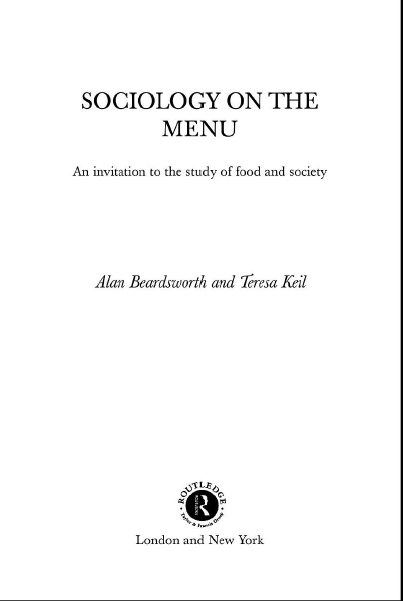
SOCIOLOGY ON THE MENU An invitation to the study of food and society
Author: Alan Beardsworth and Teresa Keil Category: Sosiologi Publisher: Routledge ISBN: 0-203-42871-4 More DetailsThe origins of this book can be traced back to the mid-1980s when we first
became aware of the curious fact that food and eating seemed to be topics for
enthusiastic discussion for virtually everyone but the sociologist. This realization
led us to begin a search for any sociologically relevant material that could satisfy
our curiosity. We then went a step further by initiating our own research into the
fascinating subject of vegetarianism, a choice of research area which was made
in order to give us access to respondents who had critically examined much of
our conventional wisdom about the day-to-day realities of eating. Grappling
with the problem of explaining our findings helped us to clarify our
understanding of what a sociology of food and eating might look like.
Happily, we were not alone in identifying an area of potentially fruitful
expansion in sociology. The amount of research and writing in this field began
to increase to such an extent that by the early 1990s we felt confident enough to
offer an undergraduate course entitled ‘Food and Society: Sociological
Perspectives’. It is that course which provided the foundations of this book and
helped us to identify the themes which we have sought to develop and illustrate.
Many people have provided assistance, both direct and indirect, in the
preparation of this text. In particular, we would like to express our appreciation
of the interest shown in our work by Alan Bryman, Nick Norgan and Alan
Radley, and of the help provided by Frank Parry of the University’s Pilkington
Library. Special thanks must also go to those colleagues with whom we have
worked in the context of a series of food- and nutrition-related projects, namely,
Barbara Dobson, Jackie Goode, Cheryl Haslam, Marie Kennedy, Emma Sherratt
and Robert Walker. We have benefited enormously from our discussions with
them and from their insight and expertise. However, any shortcomings and
inadequacies are entirely our own responsibility. The smooth progress of this
whole project has also depended heavily on the invaluable secretarial support
provided by Ann Smith, and additionally by Christine Mosley